 Petzlover
Petzlover Kyi-Leo is originated from United States but Pandikona is originated from India. Kyi-Leo may grow 36 cm / 14 inches shorter than Pandikona. Kyi-Leo may weigh 34 kg / 74 pounds lesser than Pandikona. Kyi-Leo may live 3 years more than Pandikona. Both Kyi-Leo and Pandikona has almost same litter size. Kyi-Leo requires Moderate Maintenance. But Pandikona requires Low Maintenance
Kyi-Leo is originated from United States but Pandikona is originated from India. Kyi-Leo may grow 36 cm / 14 inches shorter than Pandikona. Kyi-Leo may weigh 34 kg / 74 pounds lesser than Pandikona. Kyi-Leo may live 3 years more than Pandikona. Both Kyi-Leo and Pandikona has almost same litter size. Kyi-Leo requires Moderate Maintenance. But Pandikona requires Low Maintenance
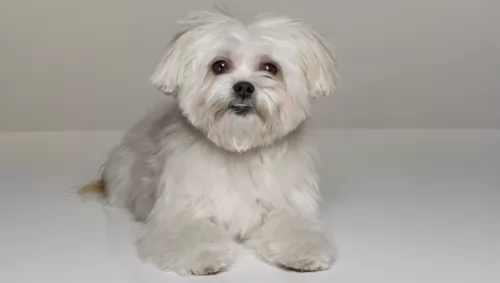 The Kyi-Leo first came about in the 1950s in San Francisco, USA, with the crossing of two dog breeds – the Lhasa Apso and the Maltese.
The Kyi-Leo first came about in the 1950s in San Francisco, USA, with the crossing of two dog breeds – the Lhasa Apso and the Maltese.
Because this is a mixed-breed dog, it isn’t recognized by the American Kennel Club, but it is recognized by some of the other dog associations such as the American Rare Breed Association or ARBA as it is known. Today the dog is looked upon as a designer breed.
 The Pandikona hails from the village of Pandikona, India, but is in danger of becoming extinct. They have always been well adapted to the harsh conditions of the Kurnool district in India, and they are considered to be a primitive-type dog breed.
The Pandikona hails from the village of Pandikona, India, but is in danger of becoming extinct. They have always been well adapted to the harsh conditions of the Kurnool district in India, and they are considered to be a primitive-type dog breed.
It has always been a territorial dog that has been used to guard villages and today it’s a dog which isn’t recognized as a standardized breed by any of the major kennel clubs. It is essentially a companion dog today.
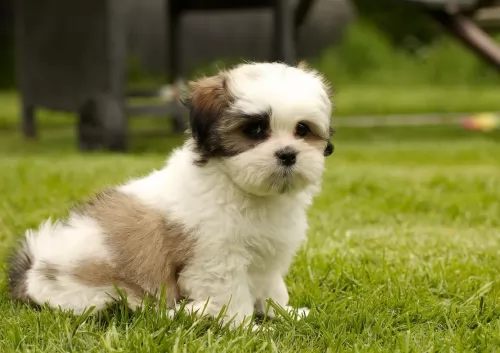 The Kyi-Leo is a small dog standing at 20 – 30cm in height and weighing in the region of 4 – 6kg.
The Kyi-Leo is a small dog standing at 20 – 30cm in height and weighing in the region of 4 – 6kg.
He has a long, silky coat which is essentially black and white or grey/silver and white or even gold and white. He has frail legs which can become injured or broken in vigorous rough and tumble games.
You can certainly describe the Kyi-Leo as a sweet, quiet, non-aggessive playful dog, and for anyone who wants a splendid pet and companion, this dog makes a great family pet and he won’t cost you an arm and a leg to feed either.
He also has an acute sense of hearing and this turns him into an excellent ‘alarm’ watch-dog. It is also a dog, that while he will love to join you on a walk, he isn’t a dog that is going to demand a lot of exercise.
He responds well to his human family, is easy-going and gentle, tending to be cautious around strangers. You can trust him to be an awesome playmate for children. In this instance, it’s the children who should be warned when playing with a dog like this as, because of his fragile build, he could easily be injured by children who haven’t been taught to respect animals.
Even though he is such an amicable pet, it will still be of benefit to you and him to have him trained and socialized. Then he responds well to basic commands such as sit, stay and lie-down.
Dogs who spend time with their family, pick up on the ‘culture’ of the family and they learn how to behave. Dogs who are left on their own and never socialized can become nervous and aggressive towards people as they never got to learn how to behave – they weren’t socialized.
 The Pandikona is a medium sized sighthound which stands at between 48 and 66cm in height and weighs in the region of 30 – 40kg. They are actually slightly built dogs, although the Pandikona can come in a variety of sizes as there is no selective breeding.
The Pandikona is a medium sized sighthound which stands at between 48 and 66cm in height and weighs in the region of 30 – 40kg. They are actually slightly built dogs, although the Pandikona can come in a variety of sizes as there is no selective breeding.
The breed’s coat is essentially short-haired and smooth with colors varying from solid fawn, white to black with white patches. Brindle is also sometimes seen. They are slim, muscular dogs with erect ears and a long tail that most times curves upwards.
These intelligent and very independent dogs are found roaming around Indian villages and guarding their owner’s property. They are territorial dogs, they are fearless too and make excellent guard dogs. They get on well with children as well as with pets, and with training they become loyal and faithful companions.
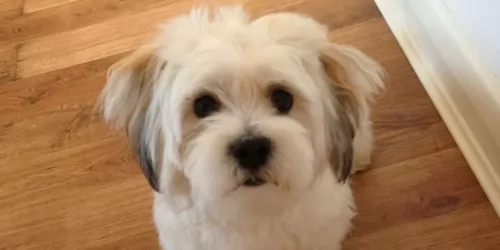 The Kyi-Leo is everything you want in a family companion – active, playful, loving, gentle, happy and balanced.
The Kyi-Leo is everything you want in a family companion – active, playful, loving, gentle, happy and balanced.
He loves his human family but tends to be a little bit wary around strangers, gradually warming to them.
He may be small, but he is robust and alert, and he is also capable of making you a good watchdog.
The Kyi-Leo is an all-round great little pet to have.
 The Pandikona may well be a primitive-type hunting dog from India but he is robust and low maintenance, and capable of making a splendid pet. That is one huge tick in his favor already.
The Pandikona may well be a primitive-type hunting dog from India but he is robust and low maintenance, and capable of making a splendid pet. That is one huge tick in his favor already.
He is an active dog who likes to be kept busy but that doesn’t mean he is too busy to give his human family his loyalty and companionship. Easy to keep, the Pandikona promises to make you the most fantastic pet and friend.
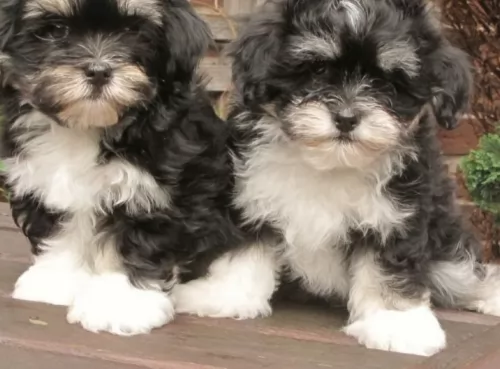 Your Kyi-Leo is such a feisty, robust little dog who is not likely to cost you much in terms of health care. With his frail legs, it is a good thing to know that you need to be careful with him in terms of back-and joint problems.
Your Kyi-Leo is such a feisty, robust little dog who is not likely to cost you much in terms of health care. With his frail legs, it is a good thing to know that you need to be careful with him in terms of back-and joint problems.
There are actually knee joint issues which are fairly common in small dogs, one of which is patellar luxation.
This is where the kneecap pops out of the thighbone, causing the dog to skip or hop. Some joint issues are genetic and may require surgery. Make sure to keep your pet’s weight under control to remove additional stress on the joints.
This is another dog illness you want to be careful with. Acute pancreatitis -inflammation - is when the condition comes on suddenly while chronic pancreatitis is when pancreatitis occurs over a period of time.
With acute pancreatitis in dogs you’ll see symptoms such as vomiting, abdominal pain, tremors and reluctance to eat. Pancreatitis can be brought on by too much fat, especially rancid fat, some anti-biotics, a low protein diet or a sickness such as diabetes.
If you suspect pancreatitis in your dog, get him as quickly as possible to the vet.
 Dogs are totally dependent on us for their care, and it is our responsibility to keep our eyes on them to ensure they are happy and healthy. It can be to you and your pet’s benefit to know some of the most common health problems that dogs face.
Dogs are totally dependent on us for their care, and it is our responsibility to keep our eyes on them to ensure they are happy and healthy. It can be to you and your pet’s benefit to know some of the most common health problems that dogs face.
The Pandikona dogs are super hardy – used to roughing it - and they’re not going to require much veterinary care. Even though this is such a hardy dog, you can never tell if a sudden canine illness strikes your pet. Sometimes it will be necessary to get your pet to the vet to be examined and to receive medication.
This is very common in dogs and an ear infection can be triggered by dirt and wax in the ear, allergies and ear mites or something else. Your dog will be scratching at his ear, shaking his head, there will be redness and possibly discharge and a nasty odor. Don’t hesitate to take your pet to the vet.
Roundworms, tapeworms and hookworms are horrible parasites that can cause a whole lot of unpleasant symptoms in your dog. He could have a cough, a dull, listless coat, diarrhea, a lack of appetite and weight loss. Treatment from the vet will depend on the type of worm that has infested your pet.
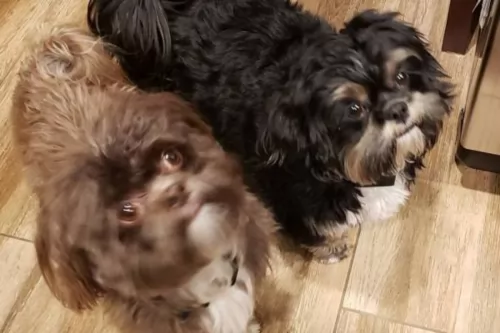 The Kyi-Leo doesn’t require vigorous exercising. One walk a day will keep them happy. There are pet owners who believe dogs can be permanently outside dogs where they can do their own exercise.
The Kyi-Leo doesn’t require vigorous exercising. One walk a day will keep them happy. There are pet owners who believe dogs can be permanently outside dogs where they can do their own exercise.
Everybody who knows dogs, knows they are social creatures who will simply lie at your backdoor just waiting for some response from their beloved human family. Every dog, regardless of breed or size, needs exercise and interaction with their humans every day.
Dogs left alone in the yard day after day are loney, frustrated and bored, and when they start digging or barking, irresponsible owners will ill treat them. These kind of people should never own a dog.
The Kyi-Leo has a sensitive stomach so he’ll need good quality food to avoid digestive problems. Ideally home-cooked food such as softly boiled chicken, brown rice and raw or cooked vegetables added into top quality kibble is the preferred diet.
Fresh, cool water needs to be constantly available.
Brush the long, silky coat at least twice a week to ensure it remains free of knotting. Brushing keeps the coat shiny too.
As a long eared dog, ears should be checked and cleaned regularly too. Air doesn’t reach the inside of their ears and the warm dampness in the ears are a breeding place for infection.
Nails should also be trimmed when they become long because left uncut they can hook onto things causing injury ad pain.
Small dogs are more prone to tartar formation and loss of teeth. You’ll notice that something isn’t right because your lively little dog will be lethargic, he may not want to eat his food and his face may be swollen. When you suspect dental problems, get him to the vet.
 There isn’t much information on the Pandikona but they have always spent their time roaming free around Indian villages. They’re used to having a lot of space to run and won’t do well in cramped spaces in the city. He wants to be busy and will certainly require you taking him on walks or allowing him to run free in a park. Ball games will also be appreciated as he loves lots of activity.
There isn’t much information on the Pandikona but they have always spent their time roaming free around Indian villages. They’re used to having a lot of space to run and won’t do well in cramped spaces in the city. He wants to be busy and will certainly require you taking him on walks or allowing him to run free in a park. Ball games will also be appreciated as he loves lots of activity.
Food is so very important to the health of dogs. As pets, the Pandikona deserves to have nutritious food which has all the right vitamins and minerals.
These days the best commercially manufactured dog foods can be a good choice for your pet and you choose these foods by reading the labels on the packaging and going according to the dog’s size, his activity levels and his age.
Dogs thrive on homemade food, especially when its simple and nutritious. Boiled chicken, some brown rice or pasta and some cooked vegetables such as sweet potato, spinach and carrots all chopped up and added into his kibble from time to time can only do him good. Some raw meat added in occasionally can also be immensely beneficial. Make sure he has always got a constant supply of fresh, cool water.
Check your Pandikona over from time to time. Check inside his ears for redness and signs of infection and check his eyes too. Brush him at least twice a week to get rid of dust and loose hairs. Trim his nails too and check inside his mouth for bad teeth.
Never ever leave him in a hot car or outside without shade and water. Make sure he has a nice dry comfortable place to sleep. He gives you unconditional love and companionship, and in exchange for this you want him to be well provided for.